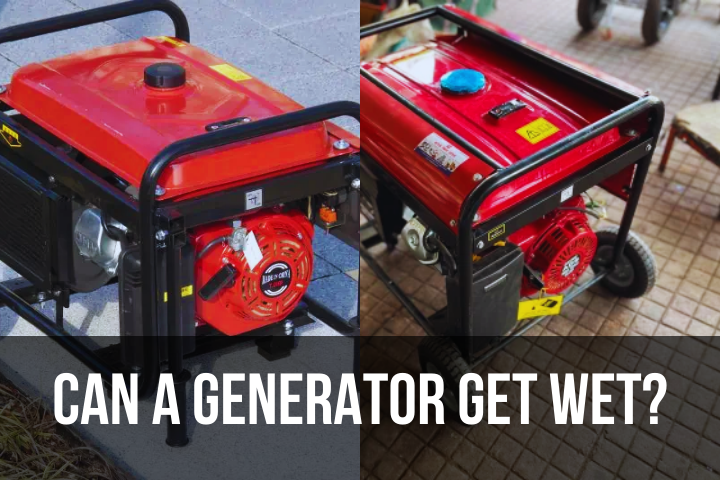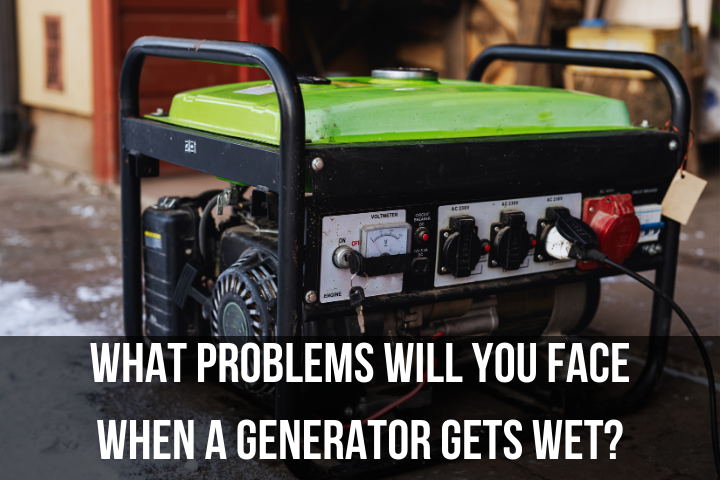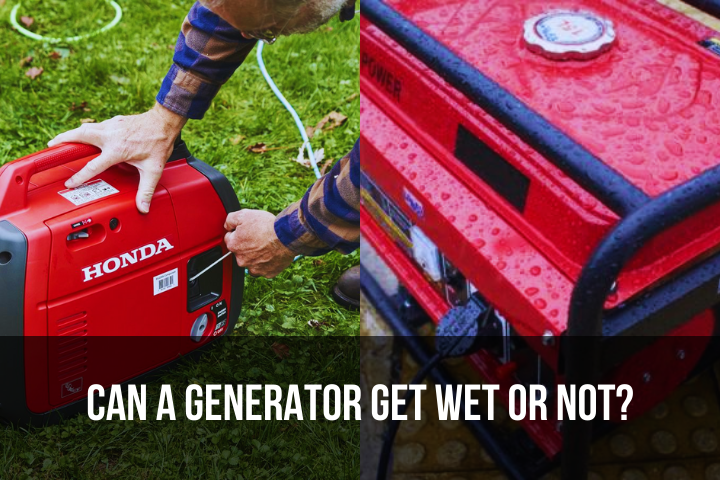Are you wondering whether a generator can get wet or not? Well, it’s a valid thought, and if you don’t know everything about it, your generator can get damaged and might permanently malfunction.
A generator can get wet in rain, storms, or when you spill water. That’s a bad thing because it can lead to shocks, fire, oil contamination, and many other problems, which can cause malfunctioning.
Luckily, you can do some things that can protect your generator and keep it running for years. Stay tuned to know what they are and a few other important things.
Table of Contents
Can a Generator Get Wet? Explaining Different Scenarios

A generator can get wet if you put it in a storm or rain. Sometimes, spilling liquid on it can also cause moisture-related problems too, but they are less severe.
However, the thing is- there are three types of generators, and people ask me questions about each of them. Therefore, I am now discussing each separately.
Can a Portable Generator Get Wet?
Yes, a portable generator can get wet, which is not good for it. People believe that since it is small and compact in size, it can withstand moisture. That’s not the truth. Portable generators can get affected if you put them under rain or storms.
Most people often bring their portable generators inside when the rain starts to pour. Well, it’s definitely a good practice, and I also recommend it. However, you should choose an indoor spot wisely. The reason is that rain droplets can enter from the windows or any other openings too.
Can a Standby Generator Get Wet?
Unfortunately, a Standby generator can also get wet and rained on. In fact, it can face more water damage than any other generator type. The worst part is- you can’t move it inside as it is fixed (unlike portable generators).
To protect it from water damage, you should cover it with any waterproof material. If you have money, I suggest building an enclosure around it.
Protecting the standby generator should be your ultimate priority because it is an expensive device. It usually costs over a thousand bucks, and its repair is not cheap, either. I will later discuss in detail the damages water causes to the generator in this article.
Can a Solar Generator Get Wet?
Solar-powered generators are also affected by water and can get wet. However, you have to do more work here than portable and standby generators. How? Well, you will also have to keep the solar panel from getting wet too.
If you don’t protect your generators from getting wet, then you will have to face lots of complications (which I am discussing next). Now, here’s a table to sum up details:
|
Generator Type |
Can it Get Wet? |
Precautions to Take if Wet |
|---|---|---|
|
Portable Generator |
Yes |
|
|
Standby Generator |
Yes |
|
|
Solar Generator |
Yes |
|
What Problems Will You Face When a Generator Gets Wet?

When a generator gets wet, you may face different issues like electric shocks, oil contamination, fire hazard, etc. You will also be unable to claim your warranty if the manufacturer finds out that your device was damaged due to water.
Let’s discuss this further.
Dangers of Electric Shock
You can get an electric zap by touching a wet generator. The reason is that water is an excellent conductor of electricity, which means you can get a shock right after the machine gets wet.
Moreover, if the extension cord is a little damaged and gets affected by moisture, it also can give a person an electric shock. Furthermore, the wet ground around the generator can also give electrocution too.
However, it is only possible if it is turned on.
Generator Malfunction
Another big problem that I have personally faced is generator malfunction. When the machine becomes wet, it cannot operate properly. The first issue will be engine damage. Water usually enters the engine chambers and causes damage to the components. It also disrupts the fuel-to-air ratio, which causes further engine problems.
As a result, the engine control panel will also get damaged. When this happens, you won’t be able to use electric switches and check the voltage regulation.
With time, the insulation will start to degrade, and the generator will then face start-up issues.
Fire Hazard
A wet generator is also a fire hazard because of electric wire failure. As I discussed above, water degrades the insulation. When this happens with the wire, sparking can occur.
That’s not it. Things will get worse if the sparking reaches the generator’s fuel. In this situation, a sudden fire will erupt, and you will see wild roaring flames. Just hope there is no more debris near the generator, or it can catch fire as well.
There’s another way water can cause a fire- Liquid can interfere with the cooling system of a generator. When this happens, the machine can overheat, which then becomes a fire hazard.
Furthermore, leakage problems are pretty common when generators get wet. If the fuel spills out, there are also chances of fire (although they are slim).
Corrosion and Rust
Corrosion and rusting are the two of the most common factors that happen when water falls on a machine’s metal components.
In most cases, I have witnessed corrosion and rust on:
- Engine
- Alternator
- Frame
- Electrical connections.
You might be wondering- what will happen if my generator faces corrosion and rust problems.
Well, the first thing that will happen is reduced efficiency. Corroded parts cannot function properly, which means the generator won’t be able to power up your home.
Moreover, there will be chances of electric circuit failures too. You will also find it hard to do the maintenance.
Long story short, a generator cannot keep working if the components get affected by corrosion and rust.
Fuel Contamination
Another problem that comes with rain is fuel contamination. Water can get mixed with gasoline or propane in the generator, which can lead to many problems. The biggest one is reduced friction, which can cause wear and tear.
Warranty Void
You can’t claim your warranty if your generator gets affected by water. It means you will have to pay for the repair and servicing of the machine, which can cost hundreds of bucks (depending on the damage).
Still, I recommend you read the warranty details of the generator model you have.
How to Protect a Generator When It Gets Wet?
When your generator gets wet, there are several things you can do to protect it. The most important one is shutting off the machine and letting it dry. You should also elevate your generator if there is flooding.
However, it is crucial you do all of these things carefully and correctly.
Shut Off the Generator
When it starts to rain or you spill a drink on a generator, the first thing to do is to turn it off immediately. It will protect you from any kind of electric shocks and other problems. However, I still recommend you do it carefully too. Do it with a wooden stick or anything that does not conduct electric current.
You can also disconnect the spark plug (just in case).
Keep It in a Dry Place
If you own a portable generator, the next thing you should do is shift it to a dry place. It can be your garage or any space that you don’t use. However, keep in mind that you must not turn on the generator when it is inside a closed space.
The reason is that this device releases carbon monoxide (although at low levels). So, if you keep it in a congested area (like a living room), the gas can build up, which can hurt your lungs.
Dry the Generator
After putting a generator in a new location, you should then help it get dry faster. You can try air drying or simply wipe it with a dry towel.
Make sure you don’t forget the plugs, switches, and outlets. I have also used rags and sponges to get rid of excessive moisture. If you own silica gel or any other moisture-absorption substances, then you can use them too.
I don’t suggest using heaters and hair dryers as they can overheat the structure.
Elevate the Generator to Avoid Flooding
In the case of storms, water can accumulate and rise up, causing flood-like situations. In this condition, I suggest you uplift the generator to make sure water does not damage the machine. You can put your generator on a table or chair (if you have a spare one). I suggest using a special generator stand for this purpose.
No matter what, you must ensure that the generator is stable and is not tilting to any side. If it falls, then the machine can get permanent damage.
Inspect the Leaks
A crucial point that most people forget here is inspecting the generator for any leakage. You should carefully check the fuel tank to see whether it is damaged or safe. It is also important to examine the coolant and exhaust system as well.
If you find out that your generator is leaking, you should immediately take action to prevent fire. I recommend:
- Tightening the loose fittings.
- Replacing fuel lines.
- Repairing any faulty components.
You can also contact a nearby technician for the repair if you think you can’t do these three things.
How to Use a Generator After It Gets Wet?
When you use a generator after it gets wet, the first thing to do is to ensure it is completely dry. Then, inspect the plug and filter to see if it is faulty or not. Then, you can fill the oil and start the generator without any worry.
Let’s delve further.
Ensure the Generator is Completely Dry
Before you try to start a generator, you must ensure that it is not wet. As I discussed above, a wet generator can cause lots of problems, like sparks. Therefore, it is better you take a good look at the machine to see if it is still wet. If you spot moisture, use a sponge to wipe it out.
Inspect Spark Plug and Filter
Inspecting the spark plug and filter is also important if you don’t want to face any problems after turning on the generator. Ensure the plug is tight and not damaged at all. Similarly, check whether the filter is corroded or in good shape.
If you think they have become faulty, I suggest you replace them.
Check Oil
It is critical to check the fuel or oil levels before you start a generator. We all know that running a machine with no oil can cause component damage. So, to avoid it, simply check the fuel levels from the control panel. If the levels are low, I recommend you refill the oil before starting the generator.
Test Run in a Safe Environment
Before you turn on your generator for hours, I recommend you do a test run first. It will ensure it is safe and is working fine.
For this, I suggest you run your generator for 10 to 15 minutes only. During this time, check whether it is overheating or there is any leakage.
If everything seems fine, then you can use your generator to power up your appliances without any worry.
Contact Professional in Case of any Problem.
Even after powering on your generator, I still recommend you keep monitoring and listening. If you hear abrupt noises coming from it, then it is better to contact a technician or repairman to find out the cause.
Most people usually complain about the generator shutting down automatically after running for 15 to 20 minutes. If you also face this problem, I recommend you turn it off and then don’t use it until a repairman fixes it.
Doing these little things will ensure you keep using the generator after it gets wet.
Related: Can You Run Generator In Rain? Find Out
Final Words
All-inclusive, a generator can get wet when it rains, or you spill water on it in any way. When this happens, the machine is at risk of malfunctioning. The generator catches fire and leaks fuel in most cases. Sometimes, it can also get corroded.
Therefore, it is critical to protect your generator when it gets wet and then follow some precautions afterward. When you do this, you will be able to use your generator for years without any worry.

